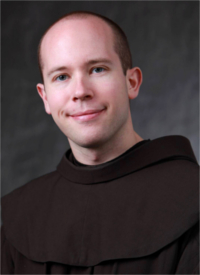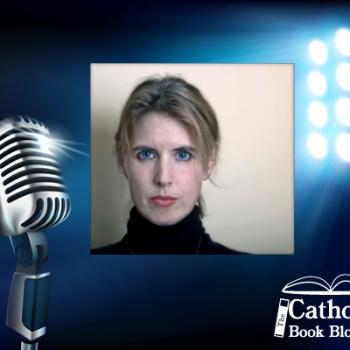PETE: The preface of your book The Last Words of Jesus: A Meditation on Love and Suffering outlines how this book came to be. For those who have yet to get it can you describe the process.
DANIEL HORAN: Well, back in 2011 the Franciscan friar in charge of organizing the Holy Week services at St. Francis of Assisi Parish on West 31st Street in Manhattan approached me with an invitation to be the annual preacher for the “7 Seven Last Words.” It is a tradition I was familiar with, but I had never actually participated in what amounts to a multi-hour prayer service. Churches all over the world have adopted this tradition of inviting someone or a team of people to offer reflections on those seven phrases Jesus utters from the Cross according to the Gospels – these include “My God, My God, Why have you Forsaken me?” “I Thirst,” “Today You Will Be With Me in Paradise,” among others.
I reluctantly agreed to be the preacher, an honor for which I didn’t feel deserving, but I nevertheless made it my Lenten intention to meditate, pray, research, and reflect on these last words during the season of Lent so that I would be ready come Good Friday. When one of my editors heard about this, she suggested that it might make a good book and that I should also keep that in the back of my mind. In the end, it turned out that the format and style did lend itself well to a book, something very close to a short Lenten retreat or series of reflections that others might appreciate.
PETE: This book is certainly presented with the Franciscan viewpoint on Love and Suffering. What makes Franciscan though on these two topics different than others?
DANIEL HORAN: That is an important observation. I wanted to make sure that the Franciscan spiritual and theological tradition that has so formed me also informed my reflections and, honestly, I’m not sure it could have been any other way. I really believe that Francis of Assisi, who remains the most famous saint in Christian history (after Mary the mother of God, of course), offers all women and men a model of Christian living. He knew intuitively what it was to love fully and suffer, as well as the centrality of these themes in the Christian tradition. What I suggest in the book’s introduction is that love and suffering aren’t contradictory in the way many might at first think. Rather, these are two sides of the same coin, which we might call passion. When one loves, truly loves in the way God calls us to love and the way Jesus modeled, she or he must let go of the control that we so desperately wish to hold onto at times and risk the vulnerability that comes with it. The Franciscan tradition, especially through the theological work of St. Bonaventure, helps to highlight the connection between the Incarnation and the Cross, the twofold place of love and suffering in the life of faith.
PETE: Meditation books for the Lenten and Advent seasons occupy a pretty crowded market. What do you think makes yours unique?
DANIEL HORAN: I explain in the preface to the book that, after being invited to give those seven initial reflections on the last words from the cross, I set out to write this book with three primary goals in mind. First, I wanted the reflections to be grounded in good Scriptural scholarship. Second, I wanted to bring in the wisdom of the Franciscan spiritual and theological tradition in an explicit way, both through the example of St. Francis of Assisi as well as in the theological insights of those who followed him. Finally, I wanted there to be an explicit social-justice dimension, a way for the reader to connect with what Jesus was saying from the Cross in real and pragmatic ways. As you mention, there are lots of books on this and other Lenten themes out there, but very few of them take these three threads and weave them together. Oftentimes it can be easy to “over spiritualize” these passages and miss the timely and personal challenge that these last words present to us — I think that one of the things that makes this book unique is the practical way each chapter calls us to pause and look at the Gospel in a new way and then reflect on what it might mean for our lives as we strive to follow in the footsteps of Christ.
PETE: You are a Franciscan friar and thus share a brotherhood with our current Pope, Francis through his namesake. Can you give us an idea of what that is like for you and your fellow Franciscans?
DANIEL HORAN: It has been exhilarating, refreshing, and challenging! Pope Francis is really living up to his namesake’s legacy in many ways, particularly as he calls us to return time and again to the centrality of evangelical poverty for all Christians and the need we have to address the concrete and material poverty that exists in our world. His pastoral sense and seemingly complete openness to relationship, especially in how accessible he appears, is right in the tradition of St. Francis. As he grew in his faith and understanding of Gospel Life, St. Francis did everything he could to tear down the walls and barriers we place between ourselves and others so that he could be a brother to all women, men, and the whole of creation. I see Pope Francis emulating that spirit and challenging all of us, but especially those of us who are formally “Franciscan,” to live that aspect of our lives with more integrity. His emphasis on mercy and justice, as well as his outspoken disdain for clericalism, fit well with the Franciscan tradition of fraternity, peacemaking, and reconciliation. He has also gestured to an increase in interreligious dialogue, something the Saint from Assisi was also known for doing. There’s a lot to be excited about and a lot to reflect upon, which is exactly what we need in our time. I know my Franciscan brothers and sisters are likewise enthusiastic and inspired.
PETE: Time for my signature ending question. This is a blog about books. What is currently on your bookshelf to read?
DANIEL HORAN: I always have a huge stack of books that I need to read, whether for school (I’m currently working on a PhD in systematic theology at Boston College), for my own research, for reviews, or for fun – there’s not enough space to list them all. I can say that I just finished an advance copy of Fr. Jim Martin, SJ’s latest, Jesus: A Pilgrimage, which is excellent. Currently, though, I’m reading two books. The first is Sr. Elizabeth Johnson, CSJ’s latest, Ask The Beasts: Darwin and the God of Love. It is wonderful so far! Professor Johnson is by far one of the best writers among academic theologians. I’ve loved reading all of her books, each of which cause me to slow down to absorb her well-crafted and insightful prose. This book is especially exciting for me to read given my own interest in the subject of theology of creation. The second book is My Age of Anxiety: Fear, Hope, Dread, and the Search for Peace of Mind by Scott Stossel, the editor of The Atlantic Magazine. A friend of mine, who has struggled personally with anxiety, and I are reading this and talking about it. It’s a fascinating book that is both well written and filled with a lot great information about the science and chemistry of anxiety and the art of psychotherapy. I also highly recommend this book.
____________________________________________________________________________________________________
You can read my review of the book The Last Words of Jesus: A Meditation on Love and Suffering here.
You can learn more about Daniel and his work at his website http://danhoran.com/
Other books by this author
Dating God: Live and Love in the Way of St. Francis
Spirit and Life: A Franciscan Guide for Spiritual Reflection
Franciscan Spirituality for the 21st Century: Selected Reflections from the Dating God Blog and Other Essays: Volume One












